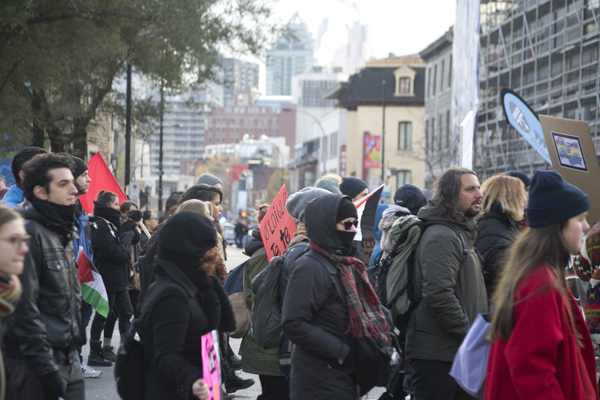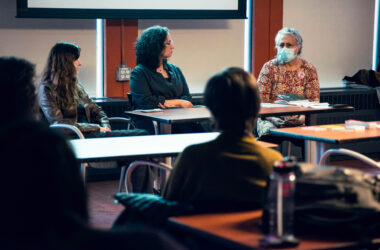Thousands of activists took to the streets of downtown Montreal on Nov. 12 for the Large Demonstration Against Hate and Racism. The protest, which began at Place Émilie-Gamelin and involved over 160 local groups, lasted three hours as marchers energetically condemned the rise of far-right ideologies in Quebec.
According to the protest’s Call to Action, the organizers of the demonstration felt compelled to act following a number of discriminatory events in Quebec’s recent history. Among them were the passing of the Quebec Charter of Values—a set of regulations to restrict public workers from wearing religious symbols proposed by the Parti Quebecois (PQ) in 2013—and the Quebec City Mosque shooting in January 2017, during which six members of the Muslim community were fatally shot in a religiously-motivated hate crime. The Call to Action also called out politicians for apathy toward racist and xenophobic sentiment that is festering in Quebec today.
Bringing together approximately 5,000 participants, the demonstration remained largely peaceful. Anas Bouslikhane, an official spokesperson for the protest, intended for the demonstration to provide a platform for minorities in the province.
“We are seeing more crystallization of racism because of efforts from the far-right and from xenophobic groups to normalize this kind of discourse,” Bouslikhane said. “[This discourse tells people] that it is ok to criticize people [for their] racial, cultural, and religious beliefs.”
Given the deep-rooted legacy of student activism in Quebec, it was only fitting that student presence at the march was strong. Both McGill and Concordia sent contingents to the protest, who marched together down Ste.-Catherine street in the hour before the demonstration’s official start at Place Émilie-Gamelin.
In the months leading up to the protest, the Students’ Society of McGill University (SSMU) showed support by signing the demonstration’s Call to Action and passing a motion to endorse the protest at its Oct. 12 Legislative Council meeting. The motion was largely motivated by concern over alt-right propaganda within the McGill community. Carl Plowright, a second-year masters student in English at McGill who attended the demonstration, emphasized that the noticeable growth of far-right ideologies on campus was no longer an issue students could ignore.
“[Far-right ideologies] have absolutely reached campuses,” Plowright said. “I think there is definitely no question that students have both suffered the repercussions of the far-right and have actively been involved in unacceptable behaviour.”
The motion to endorse the demonstration also mandated SSMU Vice-President (VP) External Connor Spencer to organize a McGill delegation to attend. A firm advocate for student voices, Spencer highlighted the importance of student activism in Quebec, especially with regards to the passage of Bill 62. Known as the “religious neutrality law,” Bill 62’s provision banning the use of face coverings when receiving public services was widely criticized for implicitly targeting Muslim women who wear niqabs or burkas.
“When the student movement stands up and says something, people listen,” Spencer said. “We still don't know what this bill is going to look like […and] the Minister of Higher Education hasn’t decided whether it is going to affect university campuses, […but] it is important that [while everyone is] figuring out what Bill 62 is, we take a very strong stance and denounce racism.”
Vincent Mousseau, VP Internal of the Social Work Student Association (SAWA), marched with the McGill contingent at the demonstration. Mousseau reflected on how Bill 62 would limit access to employment in the field of social work in an interview with The McGill Tribune.
“[Bill 62] is going to directly affect not only the people who we are able to help on the front line as social workers, but also the rising islamophobia [from] this culture [that] is going to have a mass effect on our students,” Mousseau said.
By participating in the demonstration, marchers from McGill say that they aspired to raise student awareness of events occurring in the city beyond the campus. Jed Lenetsky, an organizer at Divest Mcgill, explained the importance of student engagement in such activism.
“Groups that are involved in doing social justice work at McGill really have the responsibility to take that work off campus,” Lenetsky told the Tribune. “McGill does not exist in a vacuum. If we are going to oppose right-wing ideology and fight for social justice on campus, we also have to do so off-campus.”
Lenetsky also called attention to the fact that McGill itself contributes to regressive ideologies, citing the administration’s decision to not divest from fossil fuels as evidence.
“[The McGill Administration] said that fossil fuels do not cause grave social injury,” Lenetsky said. “By saying that, they ignore the loss of lives and the loss of livelihoods that are going to be experienced and are experienced as a result of climate change. They are really echoing this colonial ideology that some lives outweigh other lives and other experiences.”
Beyond the frame of the demonstration, Li Li, a member of the Alliance of Canadian Cinema, Television and Radio Artists (ACTRA), emphasized that activists must stand up for ethnic histories that are sometimes overlooked.
“I think, if people are willing, they can first go online and research how long different ethnicities have been [in North America],” Li said. “You have Chinese who helped build the railways. You have the Indigenous people who were here before anybody else.”
To maintain momentum in the weeks following the protest, Bouslikhane emphasized the importance of open and honest dialogue about the far-right on campus.
“I think McGill students have an important place in this work,” Bouslikhane said. “There are a lot of people from different origins at McGill […and] I encourage students to talk to each other [….] We shouldn’t be silent about [denouncing far-right ideologies.] Being complacent is being silent [and] that could lead to very tragic events.”
To avoid falling complacent to everyday injustices, Mousseau suggested that McGill students support Montreal-based organizations such as Solidarity Across Borders, which provides aid to groups affected by racism and racist immigration policies.
“We have shaped politics in this province and in this country. We need to continue doing that,” Mousseau said. “We won’t tolerate racism and fascism in our cities, and we won’t tolerate them in our country.”








